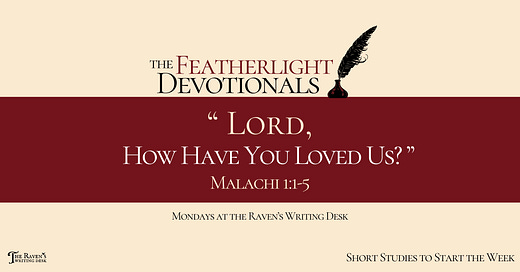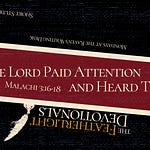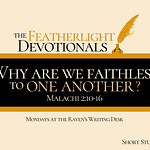This is the first of the new “Featherlight Devotionals” series, looking first at the book of Malachi. Every Monday morning, I will release a short study, which will give you some context, and encourage you to read, reflect on, pray through, and contemplate the passage. Today we’ll be looking at Malachi 1:2-5. I highly suggest you use your own Bible for the reading, and set your phone aside if you can.
“Does he really love me?”
Countless Rom-Coms, family dramas, and counselling sessions are in progress right at this moment predicated on that exact question.
Sadly, we can’t always trust the feelings and motives of those closest to us. We are fallible. People make mistakes, say the wrong things, and aren’t always there when we need them. We have all been in relationships, romantic or otherwise, that haven’t lived up the standard we hoped for, and we’ve left feeling hurt and dejected. At times though, the enemy tempts us to attribute these same lowly failings to our Most High God. This mentality had become systemic among the people of God in Malachi’s day, and had even spread among the priesthood.
These people, who were meant to be God’s representatives on earth had begun offering false sacrifices (1:7), were calling evil good (2:17), and were known for being unfaithful to their wives (2:14-15.)
All the while, they cried out for the God of justice (2:17.)
Principals for Reading the Minor Prophets
God’s people asked for justice, and received justice.
It had to start from within.
If you’re a Christian reading this, you know well the sanctifying work of the Spirit within you. There have been times when you have been tempted to sin, or standing in the wake of the sins you’ve committed, and you’ve sensed the grave nature of the act.
At times, the language in the minor prophets can seem too harsh to our modern ears. We hear rebuke, and condemnation, and it irks us. Whenever you read such verses, think through the following:
What has Jesus taken for us, and what has the Father given us?
The truth is that we have all sinned and fallen short of the glory of God (Rom 3:23), and we deserve that very same commendation.
But.
“Whoever believes in him is not condemned, but whoever does not believe is condemned already, because he has not believed in the name of the only Son of God. And this is the judgment: the light has come into the world, and people loved the darkness rather than the light because their works were evil.”
John 3:19 ESVUK
Keep that in mind and we read the passage together.
1. Reading
First, read or listen to the passage quickly. Then, slow down, allowing the words to sink in, as you read it a second time prayerfully.
“I have loved you,” says the Lord.
But you say, “How have you loved us?”
“Is not Esau Jacob's brother?” declares the Lord.
“Yet I have loved Jacob but Esau I have hated.
I have laid waste his hill country and left his heritage to jackals of the desert.”
If Edom says, “We are shattered but we will rebuild the ruins,”
the Lord of hosts says, “They may build, but I will tear down, and they will be called ‘the wicked country’, and ‘the people with whom the Lord is angry for ever.’”
Your own eyes shall see this, and you shall say,
“Great is the Lord beyond the border of Israel!”Malachi 1:2-5 ESVUK
2. Silent Reflection
Now, the hard bit. Take 60 seconds to pause and reflect.
Close your eyes, sit in silence, and consider the word of God.
Here are some questions to help you:
- How many ways did God show me his love just last week?
- Do I trust the Lord to deal justly with the wicked?
- What does it mean that the Lord is “great beyond the border of Israel?”
You don’t need to restrict yourself to these questions.
Just let the Spirit guide you in this time of reflection.
3. Prayer
Let’s now enter into a time of prayer. Here’s a prayer based on today’s passage:
Lord,
I know you love me, but when I am tempted to ask, “How have you loved me?” remind me of your blessings, stir your Spirit within me, and help me to fix my eyes upon Jesus.
Help my heart to trust you with those who are unjust, for you are a God of Justice.
You, O Lord of hosts, have said that the wicked may build, but you will tear down. Help me to show mercy to those with whom you are merciful, just as you have poured out your mercy upon me.Your wrath and your justice and perfect.
Help me never to think the same of myself.Great are you Lord, beyond the borders of Israel, to the ends of the earth.
Amen.
Take a moment to continue in your own words.
You might pray for:
Someone who is far from God
For God to remind you of his love
For guidance in showing kindness to others
For faith enough to trust God when all seems lost
For unbelievers in your congregation
4. Contemplation
Fast forward five years… Someone invites you into a conversation about the minor prophets, and you engage with eight distinct takeaways about the book of Malachi.
How helpful would that be?
Each week I will ask you to write down just one thing, anything. Maybe it’s a verse, or a portion of a verse. You might have been struck by a line from the prayer, by a point of application, or by a question you’d never thought of before.
One line might seem trite, but if you try and remember everything, you won’t remember anything.
Take a second to reflect.
Write it down.
Each week, refer back to the lines you’ve already written, and over time they will cement more and more in your memory.
5. PAQs (Possibly Asked Questions)
Here are some brief answers to questions that may have come to mind during today’s reading:
- What does it mean that God is angry forever?
In Psalm 103, we read:
The LORD is merciful and gracious,
slow to anger and abounding in steadfast love.
He will not always chide, nor will he keep his anger forever.Psalm 103:8-9 ESVUK
During this life, we have experienced both God’s justice, and his mercy. When we were still abiding in our sin, we received rebuke, and an invitation into his grace. As such, we can now sing Psalm 103 full of faith and thankfulness.
Never forget though, that we didn’t deserve this end.
The eternal life we have in Christ isn’t something we earned, but a gift we received. Those who do not put their own crown at the foot of the cross, and humble themselves before God, will endure the full weight of their own sin. They will know the wrath of the Lord in eternity.
- Can a God of love hate?
Yes, and no. In Luke 14:26, Jesus says something odd:
“If anyone comes to me and does not hate his own father and mother and wife and children and brothers and sisters, yes, and even his own life, he cannot be my disciple. Whoever does not bear his own cross and come after me cannot be my disciple.”
Luke 14:26–27 ESVUK
So we all hate our parents and families? Of course not. Hate and love in the Biblical sense aren’t so much something we feel as something we do. When I wake up each morning, I have feelings of love for my wife, but that’s useless if I don’t choose to actively love her. Put simply, love is unity, and hate is separation. God “hates” Edom because they are not his people and are separated from him.
Feel free to reach out with any other questions you might have, or leave a comment to discuss further.
This was a little longer than I’d hoped, I’m still getting used to the shorter word count, please bear with me as I learn to use my self-appointed restraints!
Thank you for joining me this morning. May God’s Word continue to guide and bless you throughout your week.
Grace and Peace,
















Share this post